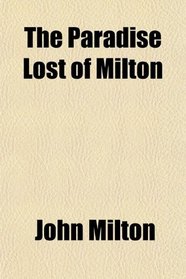a really long book but it talks alot about faith and was really good
Add this reviewer to the list of people who hold Paradise Lost up to the lofty title of The Greatest Epic Poem in the English Language; it is not only this, but one of the best in any language. Writing unabashedly in the tradition of unrhymed Homeric epic verse, Mitlon was working well within what was earlier purveyed by Homer, Virgil, and Dante -- but he brings his own distinctive touch and flair to the work. The opening lines of the long poem are clearly inspired by Homer, as are other elements, but Milton has a very unique poetic style; long sentences, often with the principle verb at the end, being one of its mainstays. This language is very grandiose and quite complex; it takes a while to get used to it -- you will have to pay very close attention during the first book -- but, as with most classical literature, once the reader gets the hang of it, it goes quite smoothly. The Divine Comedy of Dante has a more towring reputation than does Milton's Paradise Lost -- for one thing, it is older -- but I among those who find Milton to be superior. The Divine Comedy is, certainly, an undisputed masterpiece, but, where it was, more or less, a satire and a thinly-veiled attack on many of Dante's political enemies, Milton's work deals with much more complex and profound subject matter: why mankind fell, how the gods themselves operate and think, the nature and attractiveness of evil and sin, the importance of love in human relationships, the moral problems of God's justice. It is true that Dante's work is more original; Paradise Lost and Paradise Regained, at least in seed, come straight from The Bible. But Milton only uses these stories as a springboard for the exploration of the latent moral and ethical problems lurking beneath. Milton explores these problems with a refreshingly fresh perspective -- strictly within the Christian tradition, to be sure, but far from fundamentalist, and even quite radical for its day. Although some cite the work as Christian apologist, there are certainly many elements within the poem that many of the more hard-line Christians would be taken aback by; it was, of course, even more controversial in its day. One thing about the work that often gets pointed out is that Satan is a far more interesting and appealing character than God. This, in my view, does not have Milton unwittingly on the Devil's side, as some critics have suggested. Rather, he is pointing out how appealing sin is always is: of course it's interesting, of course it's appealing -- otherwise, we wouldn't keep falling for it again and again and again. If we saw its razor-sharp fangs and [dripping] mouth, we would have stopped getting ensnared in its trap long ago.




